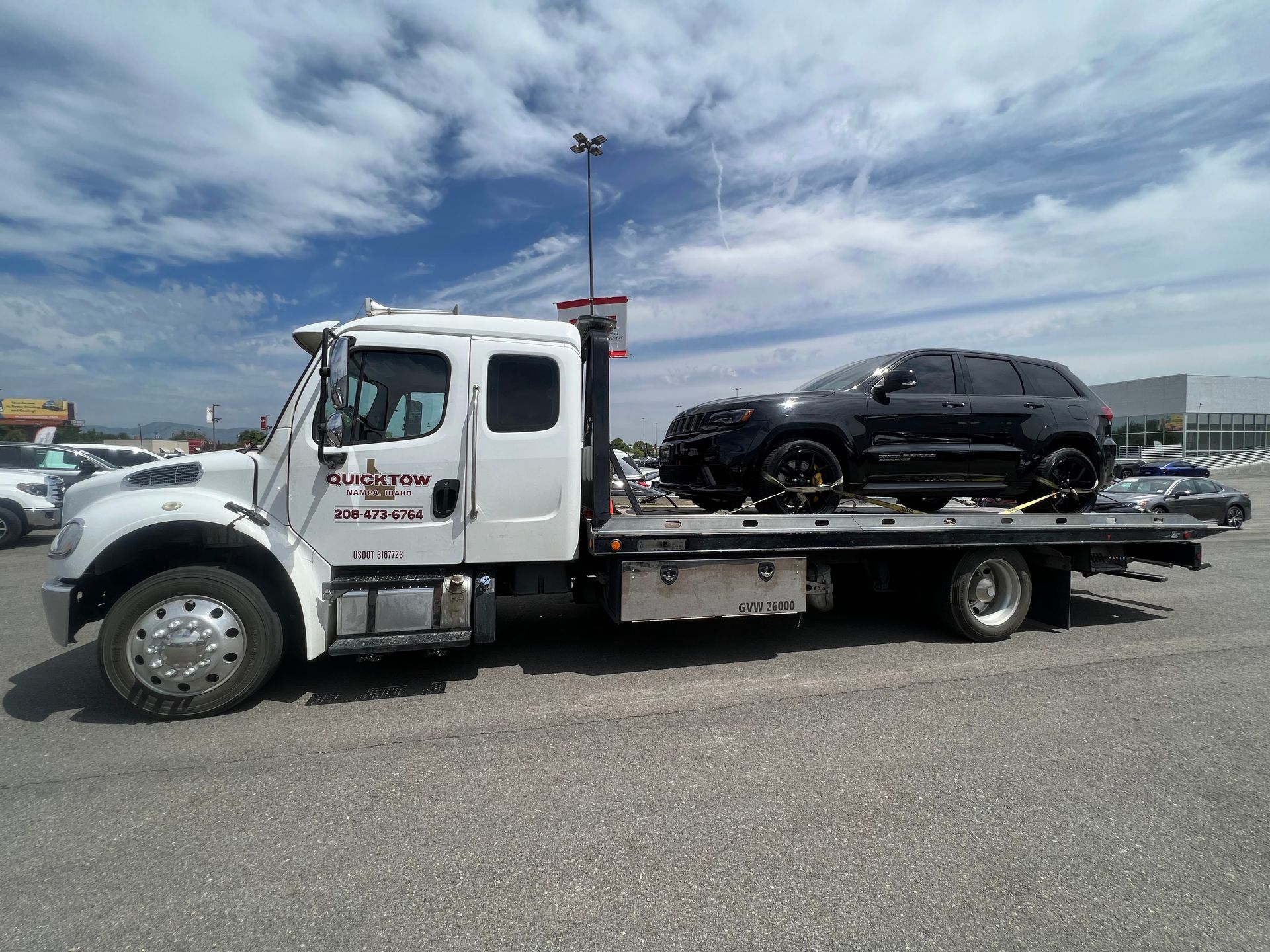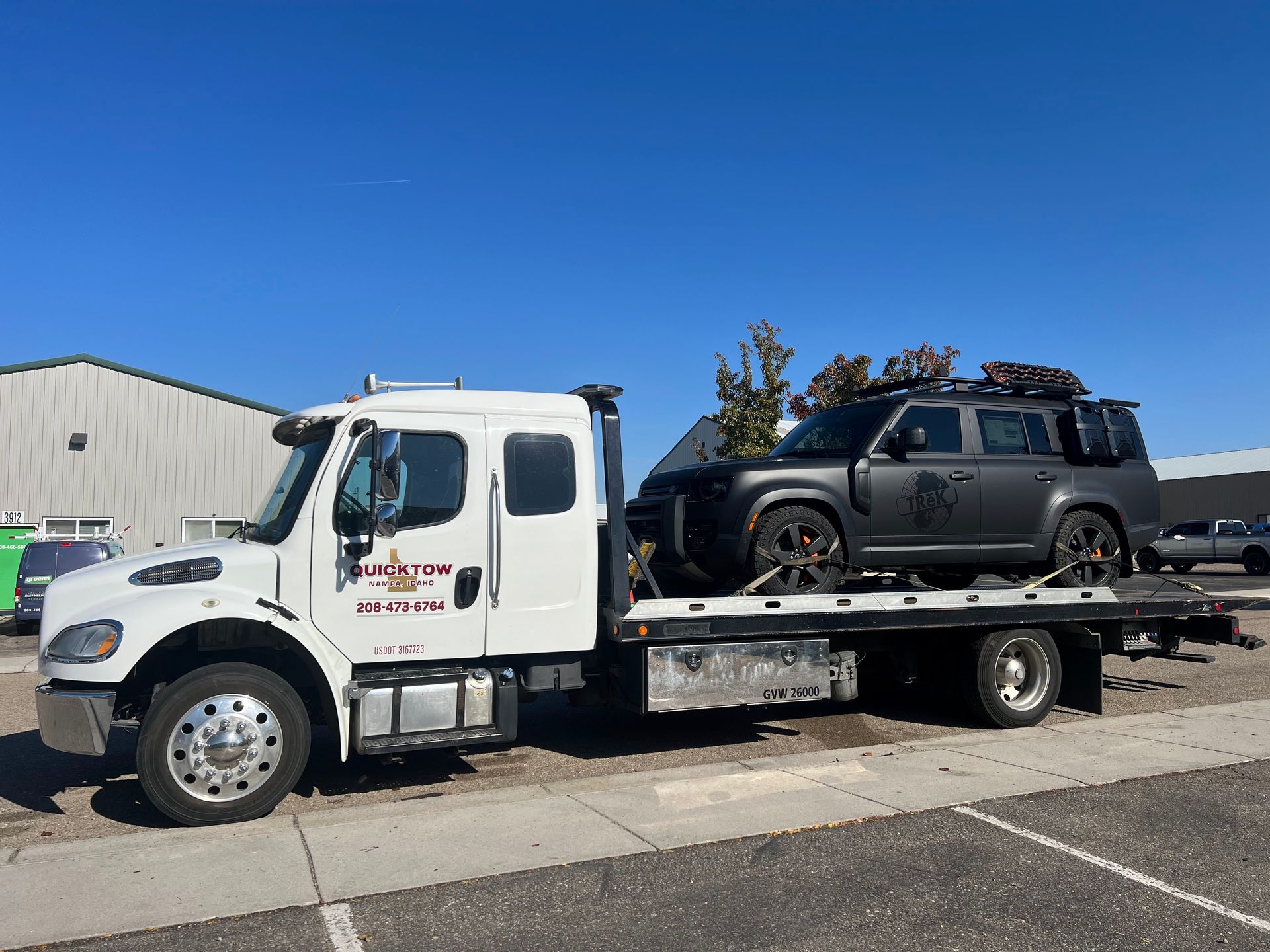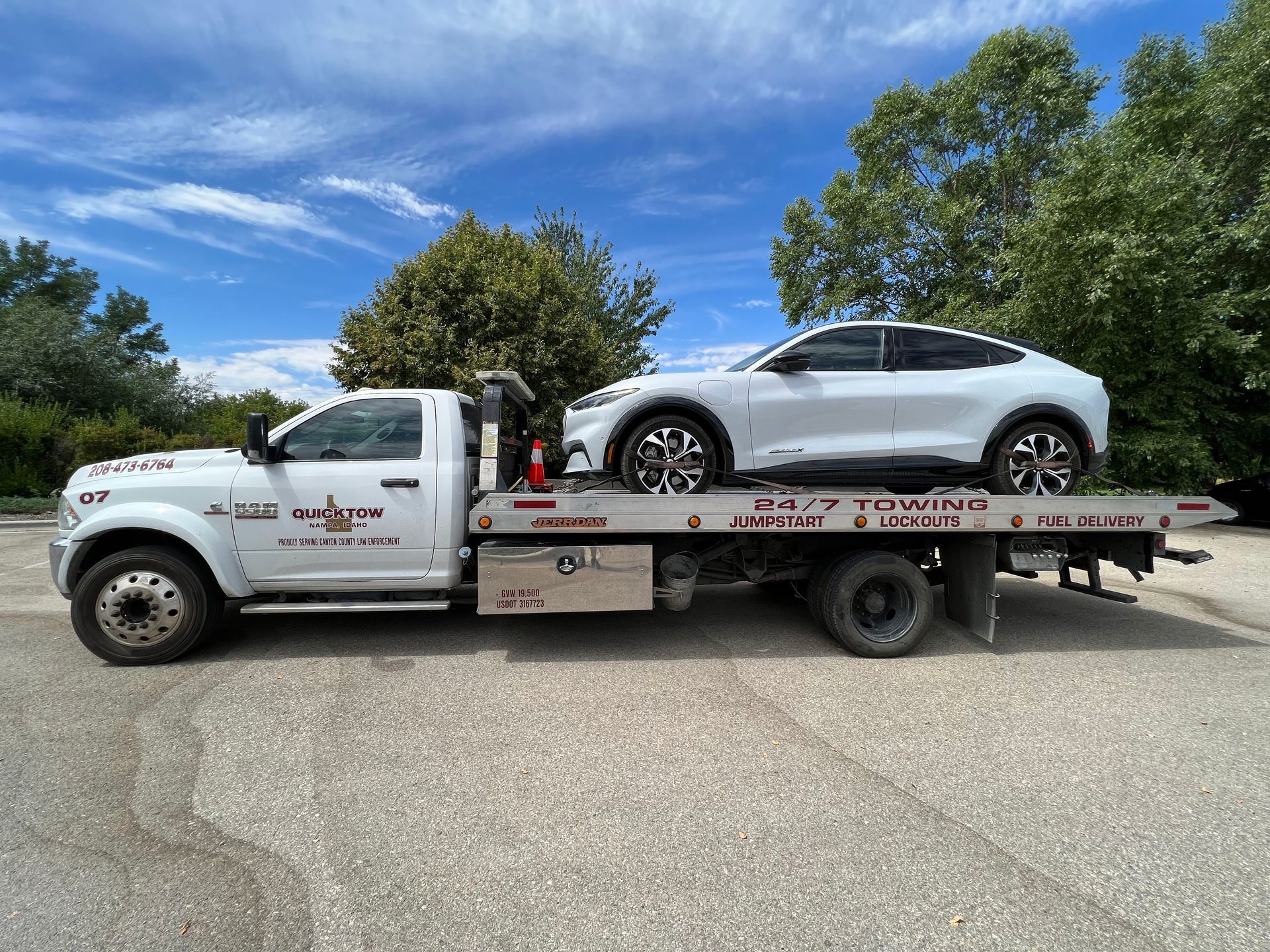Quality. Safety. Efficiency.
Idaho Towing Laws Guide Including Private Property
Navigating Idaho's towing laws can feel like trekking through the wilderness without a map! In this post, we're going to discuss the often-misunderstood world of vehicle towing, especially on private property in Idaho. From Boise to Coeur d'Alene, understanding these regulations is important for vehicle owners and property managers. We’ll dissect Idaho's towing rules, providing essential insights for anyone who might face a towing situation.
If you're in Idaho and need a tow truck, we can help. Whether it's emergency towing in the Boise area or you need a car towed across the state, we can do that for you. Click the button below or call us at (208) 473-6764 to get a quote.
Idaho Car Towing Laws
Idaho's car towing laws are designed to balance the rights of property owners with those of vehicle owners. Here are some key points:
- Private Property Towing: In Idaho, property owners have the right to tow vehicles that are illegally parked on their property. However, there are specific guidelines and signage requirements that must be met. For instance, visible signs indicating parking restrictions must be placed at all entrances to the parking area.
- Notification Requirements: Once a vehicle is towed, the towing company is typically required to notify local law enforcement. This helps in tracking towed vehicles and assists owners in locating their vehicles.
- Reasonable Towing Fees: Idaho law generally mandates that towing companies charge reasonable and customary fees. This prevents exorbitant charges for towing and storage of vehicles.Towing companies are generally expected to charge fees that are comparable to other local businesses offering similar towing services. This helps prevent price gouging.
- Release of the Vehicle: If a vehicle owner arrives while their car is in the process of being towed but hasn't left the property, the towing company usually must release the vehicle, often for a fee.
- Redress for Illegal Towing: Vehicle owners who believe their car was wrongfully towed have the right to challenge the tow. Legal recourses include disputing charges or even taking legal action if the towing was not in compliance with Idaho laws.
Idaho Tow Truck Laws
Idaho tow truck laws encompass a range of regulations designed to ensure safe, fair, and legal towing practices across the state. Here are some basic elements of Idaho's tow truck laws:
- Licensing and Certification: Tow truck operators in Idaho are required to be properly licensed and certified. This ensures that they have the necessary skills and knowledge to safely operate a tow truck and handle vehicles being towed.
- Equipment Standards: Idaho law mandates that tow trucks be equipped with specific types of equipment. This would include lights, brakes, and mirrors, to ensure safety not only for the tow truck operators but also for other road users.
- Safety Regulations: Tow trucks must adhere to safety regulations that include the secure fastening of towed vehicles, proper signaling and lighting, and compliance with traffic laws.
- Insurance Requirements: Tow truck operators are required to carry a certain level of insurance coverage. This protects both the tow truck operator and the owner of the vehicle being towed in case of damage or loss.
- Response to Accidents: Tow trucks often play a crucial role in responding to vehicular accidents. Idaho laws regulate how tow trucks can operate at accident scenes, focusing on safety and coordination with law enforcement and emergency responders.
- Impoundment and Storage: The law also covers the impoundment and storage of vehicles. This includes where and how long a vehicle can be held, access to the vehicle by the owner, and conditions for release.
- Consumer Protection: Idaho tow truck laws include provisions to protect consumers from unfair practices such as overcharging, illegal towing, or inadequate notification about towed vehicles.
Trailer Towing Laws
Idaho's trailer towing laws are created to make sure there’s safety on the roads both for the driver towing the trailer and for other road users. Here's a brief overview:
- License and Registration: Trailers must be properly licensed and registered in accordance with Idaho state law. This includes ensuring that the trailer displays a valid license plate.
- Towing Capacity: It's essential that the towing vehicle's capacity is adequate for the trailer being towed. This means the vehicle should be able to safely handle the trailer's weight, including its load.
- Safety Chains: Idaho law requires that trailers be secured to the towing vehicle with safety chains. This is a precautionary measure in case the primary coupling device fails.
- Brakes: Trailers with a gross weight above a certain threshold (usually 1,500 pounds) must be equipped with their own braking system. Additionally, this braking system should be operable from the driver's seat of the towing vehicle.
- Lights and Reflectors: Trailers must have proper lighting, including brake lights, turn signals, and reflectors, to ensure visibility. These lights must be in sync with the towing vehicle’s lighting system.
- Mirrors: The driver must have a clear view of the road behind. If the trailer obstructs the view from the standard rear-view mirror, additional external mirrors on the towing vehicle may be required.
- Width, Length, and Height Limits: Idaho imposes limits on the dimensions of trailers. Exceeding these limits may require special permits or escort vehicles.
- Load Securing: Any load carried in the trailer must be properly secured to prevent it from shifting or falling out.
Triple Towing Laws
In Idaho, triple towing, also known as triple trailering, refers to pulling two trailers or vehicles in tandem behind a primary towing vehicle. This practice is permissible under certain conditions, making Idaho one of the few states that allow triple towing. Below are some general aspects of Idaho's triple towing laws:
- License Requirements: Drivers typically need a special endorsement on their driver's license to engage in triple towing. This endorsement indicates that they have passed the necessary tests to handle the increased complexity and safety risks of triple towing.
- Length Restrictions: There are maximum length limits for triple towing combinations. The total combined length of the towing vehicle and its trailers should not exceed a certain limit, typically around 75 feet.
- Safety Equipment: All towed units must have safety chains and appropriate braking systems. The braking system of the trailers should be operable from the driver's seat of the towing vehicle.
- Lighting and Reflectors: Each unit in the triple tow setup must have proper lighting and reflectors to enhance visibility and signal intentions to other drivers.
- Width and Height Limits: The trailers must adhere to standard width and height limits to ensure safe passage on roads and under bridges.
- Road Restrictions: Triple towing might be restricted on certain roads, particularly those with sharp curves, narrow lanes, or steep grades. Drivers should check Idaho transportation regulations and road signs for any specific restrictions.
- Speed Limits: There may be reduced speed limits applicable to vehicles engaged in triple towing.
Idaho Private Property Towing Laws
Idaho's private property towing laws regulate the removal of unauthorized vehicles from private property, balancing the rights of property owners with those of vehicle owners. These laws are particularly relevant for businesses and private individuals who manage parking areas. Here are some guidelines to consider:
- Signage Requirements: For a vehicle to be legally towed from private property without the owner's consent, clear signage must typically be posted at all entrances. These signs should indicate that unauthorized parking is prohibited and may result in towing, and often need to include details such as the contact information of the towing company.
- Authorization for Towing: The property owner or their agent must authorize the tow. This often involves providing a signed request to the towing company, except in certain situations like when a vehicle is blocking a driveway or entrance.
- Timely Notification: After a vehicle is towed, Idaho law usually requires that the local police or sheriff's department be notified within a specific timeframe. This helps vehicle owners locate their towed cars.
- Reasonable Towing and Storage Fees: The fees charged by towing companies must be reasonable and are sometimes regulated by local ordinances.
- Access to Towed Vehicles: Owners of towed vehicles have the right to retrieve their personal belongings from the vehicle, even if they can't pay to retrieve the vehicle immediately.
- Dispute Resolution: Vehicle owners who believe their vehicle was wrongfully towed from private property have the right to dispute the tow and seek compensation. This is especially true if it was done so illegally.
Idaho Towing Laws Guide Conclusion
At QuickTow and Recovery, we bring years of expertise to the table in navigating the landscape of towing across Idaho, particularly in the Treasure Valley. Our deep understanding of state and local towing regulations ensures that we provide services that are not only compliant but also efficient and reliable. Whether it's a routine tow or a complex situation involving private property, our seasoned team is equipped to handle it all. For any towing needs you may have, remember that QuickTow and Recovery is just a call away.

VISIT US
OFFICE HOURS
Monday - Friday 9:00 AM - 5:00 PM
CONTACT US
Call or Text




